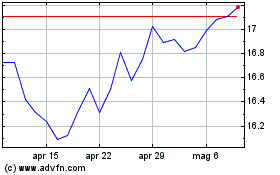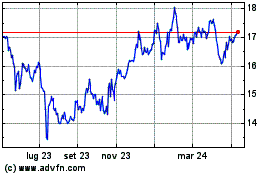EPA Settles Underground Storage Tank Violations With AT&T, Wawa, Others -- OPIS
30 Ottobre 2023 - 8:44PM
Dow Jones News
EPA on Monday said fuel retailer Wawa Inc., telecommunications
giant AT&T Inc. and five smaller firms have agreed to pay fines
related to alleged violations of federal rules governing the
operation and maintenance of underground petroleum storage
tanks.
Under four separate enforcement agreements, the companies also
promised to review their compliance programs to make sure they
adhere to the agency's regulations.
EPA said improperly operated or maintained USTs can leak
petroleum and other hazardous substances, threatening soil and
water quality. EPA said in a news release that Wawa settled with
the agency for violating federal regulations on USTs containing
gasoline or diesel fuel.
The agency said that based on inspections in February and March
2022, it "determined the company had failed to meet operator
training, record keeping, and leak detection requirements for
USTs."
Wawa, which operates more than 1,000 retail fuel and convenience
stores along the East Coast, agreed to pay a civil penalty of
$26,500 and "certify its compliance with UST regulations at its
facilities," EPA said.
In addition, EPA said AT&T Transoceanic Comm. LLC, which
owns and operates UST for emergency power generators at 28
facilities in New York, New Jersey and the U.S. Virgin Islands,
"violated federal rules on spill prevention, inspections, and
operator training at three of its facilities in the U.S. Virgin
Islands, which EPA inspected in 2022."
AT&T agreed to pay a $40,000 penalty and "conduct a
comprehensive audit of its compliance with all UST rules at its New
York and New Jersey facilities," the agency said.
EPA also announced similar settlements with five other
companies, which operate 24 gas stations in New York and New
Jersey, for violating federal regulations on USTs containing
gasoline or diesel. Those fines totaled $225,000.
According to EPA, about 542,000 underground storage tanks
nationwide store petroleum or hazardous substances. While the
agency said the greatest potential threat from a leaking UST is
contamination of groundwater, a source of drinking water for nearly
half of all Americans, leaks also increase the risk of fire and
explosions.
Until the mid-1980s, most USTs were made of bare steel, which is
likely to corrode over time and allow UST contents to leak into the
environment, the agency said. Faulty installation or inadequate
operating and maintenance procedures also can cause USTs to leak,
it said.
This content was created by Oil Price Information Service, which
is operated by Dow Jones & Co. OPIS is run independently from
Dow Jones Newswires and The Wall Street Journal.
--Reporting by Frank Tang, ftang@opisnet.com; Editing by Jeff
Barber, jbarber@opisnet.com
(END) Dow Jones Newswires
October 30, 2023 15:29 ET (19:29 GMT)
Copyright (c) 2023 Dow Jones & Company, Inc.
Grafico Azioni AT&T (NYSE:T)
Storico
Da Apr 2024 a Mag 2024

Grafico Azioni AT&T (NYSE:T)
Storico
Da Mag 2023 a Mag 2024
